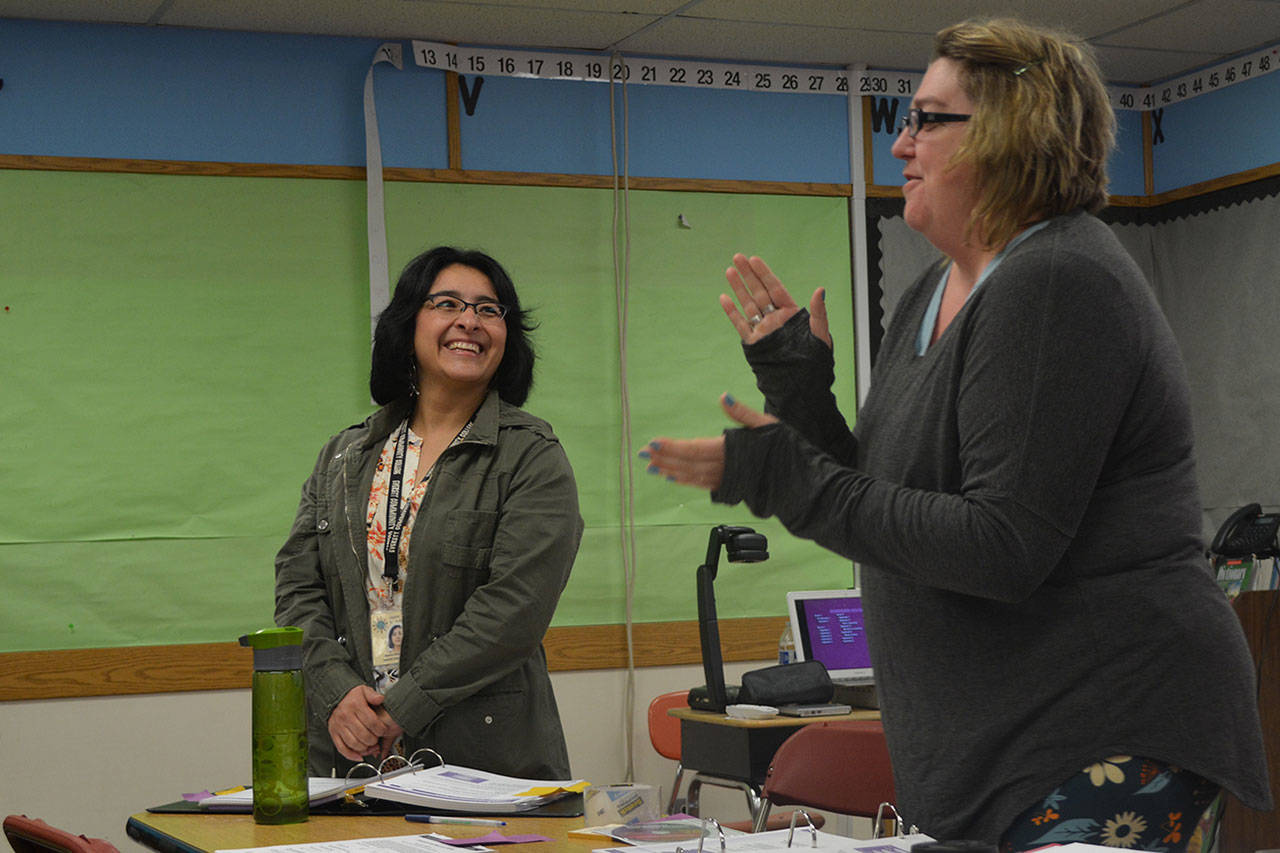MARYSVILLE – It can be hard to make good choices as a teenager because of peer pressure.
Imagine the added difficulty if you are from another country and speak a different language.
Esperanza Martinez said her family moved here fairly recently from Mexico. She said, via interpreter Monica Gibson, that her children want to be accepted so badly that they practically would do anything to make friends. One of the things asked of them was to bring lunches for the others.
She worries they would be “exposed to bad influences.”
That is why she and about 10 other Spanish-speaking mothers are taking a class at Kellogg Marsh Elementary School.
The class, taught by Kim Reynolds, teaches all parents how to help their kids made good choices. It teaches parents that the family eating dinner together is No. 1, because it can help in communication. Another session starts today at the Living Room Coffee House in both English and Spanish.
Martinez said her kids did not have those same problems in Mexico because of established friendships. As for the class, Martinez said she liked the advice taught that if her children are asked to do something they don’t want to do, they should “propose something else they can do together.”
Karina Perez, who is a member of the Marysville School District’s Natural Leaders program, said she felt much the same way when she came to this country at age 12. She was bullied by a girl who said she was not allowed to even look at her.
“I had to hide,” Perez said.
She said the class meets in a portable because the moms are “uncomfortable in the classroom.” She said they want to help the moms learn English, but haven’t found a teacher yet. Many know some English, but they’re “too nervous to speak it.”
But with Gibson’s help, they are going through a book over five weeks and learning things like: dealing with anger, strengthening the family, having healthy beliefs and saying no to drugs.
Martha Diaz said she took the class because her oldest is nearing the teen-age years, and she wants to prepare “for the future.”
Cristina Hernandez said the class is helping because her kids are becoming a little disrespectful.
Nereida Areliz said it has been hard on her kids because they had to leave their friends so they feel alone.
Alma Lopez said she is learning to better communicate with her kids. She said her parents used to do the things the course is recommending.
Perez said the family meetings are really helping her.
“We’ve never done them before,” she said. “They are more open to telling me things, issues at school or feelings.”
Reynolds said the course is not just about drug prevention, but it is much better than the old DARE program. She said that program failed because it actually taught kids how to do drugs.
In this program, kids are taught how to seek alternatives.
“I want to be your friend but I’m not going to do that thing,” Reynolds said.
A couple of the moms said they couldn’t believe how early in school their kids were asked if they wanted to do drugs or alcohol.
“I was shocked,” Perez said. “An offer in middle school.”
Lopez agreed. She said one of her children was offered vodka at school.
“You think it is not possible, but it is,” she said.
Wendy Messarina Volosin, a parent liaison for the district, said some kids just grab things from home.
Reynolds added that some parents allow use at home. They need to be educated on the damage that can be done to their young minds.
She said parents also need to keep track of their painkillers.
“Communicate why we have to use them,” she said, adding that any extras need to be turned over to police so they aren’t used incorrectly.
Another issue the families from Mexico have is that in Latin American culture it is more accepted for kids to drink. “That’s an important piece” that needs to be taught, Reynolds said. In making a comparison, she said just because the parent drives doesn’t mean it’s OK for the child to drive. Lopez said it can be a temptation for kids when they are around it so much.
“We need to break the cycle,” Perez said, and explain why alcohol and drugs are so bad and the health benefits of staying off them.
Reynolds concluded: “We are responsible for navigating our families through this.”



